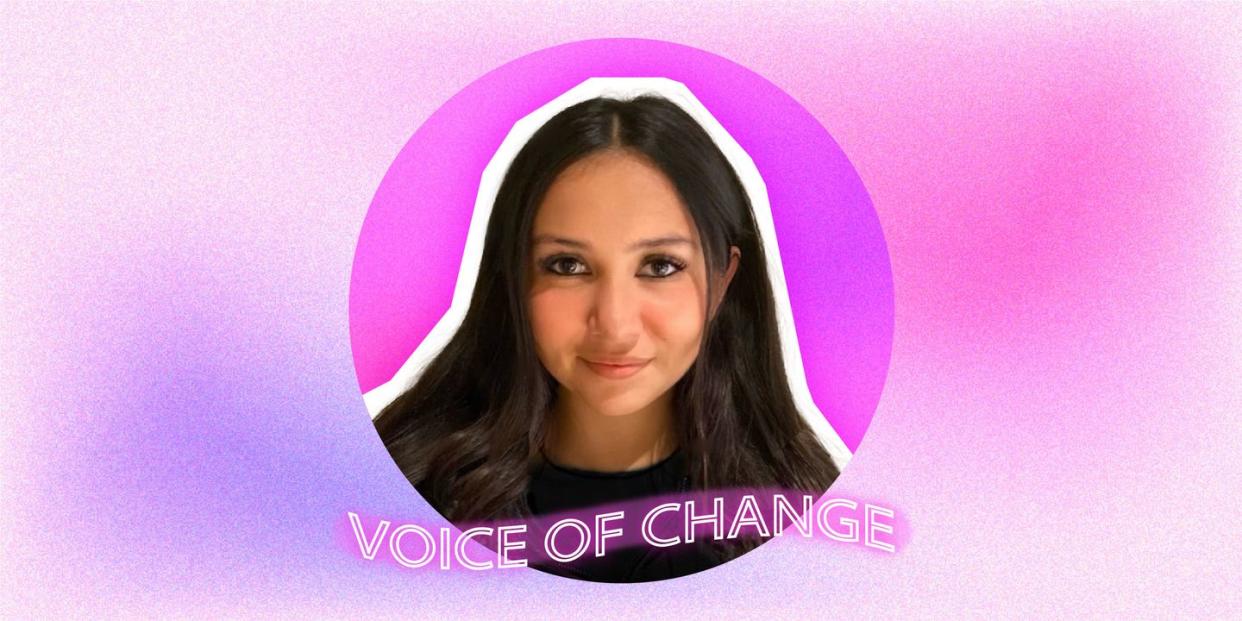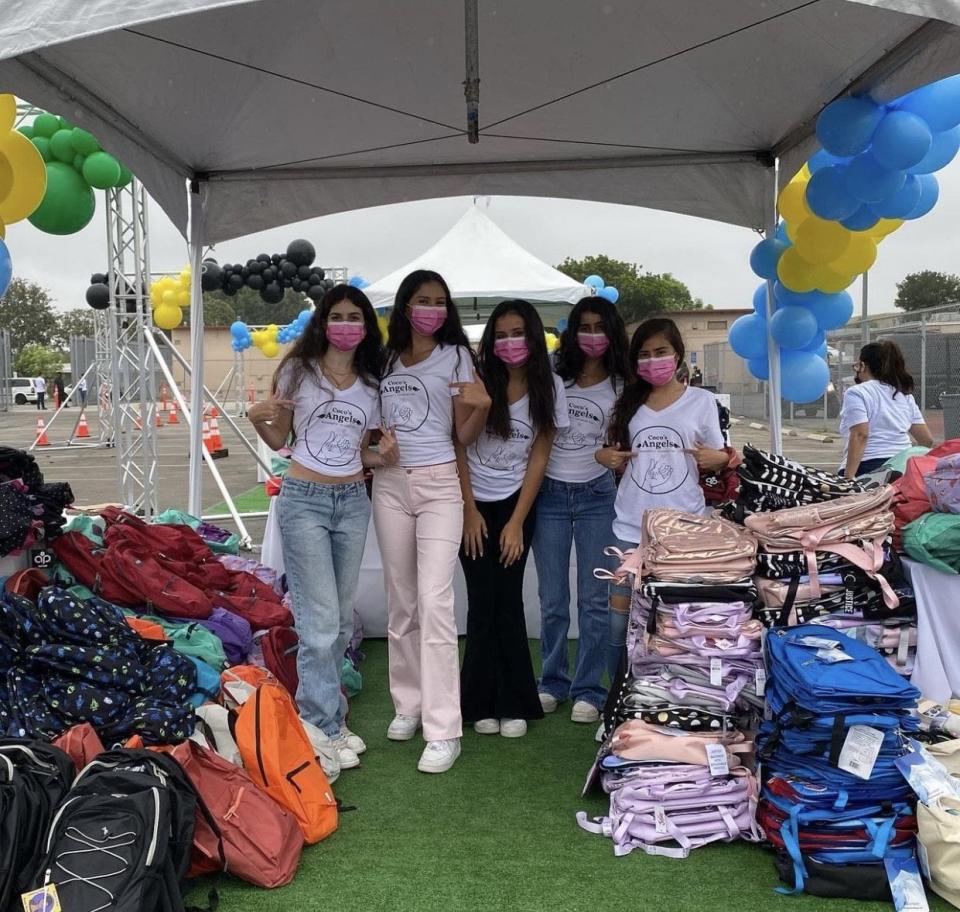Delara Tehranchi Founded a Nonprofit to Support and Empower Foster Youth of Los Angeles

Even during the most challenging times in history, it's important to highlight those who are continuing to follow their dreams and are taking strides to make the world a better place. Each month, Seventeen is honoring young people as Voices of Change, those who are making a difference in their community and the world at large.
When Delara Tehranchi envisions her future, she sees herself at the forefront of foster care activism, raising awareness and bettering the fractured system that exists in the United States. It’s a lofty goal, but at 17 years old, the high school senior is already on a distinct path to effecting real, powerful change.
About two years ago, Delara became a foster care sister after her mother, an OB/GYN in Los Angeles, delivered a baby experiencing withdrawal from her biological mother’s addiction to meth and heroin. Rather than let the baby, Coco, enter foster care, Delara and her family decided to foster, and eventually, adopt the infant. Throughout the pandemic and between Zoom classes, Delara cared and tended to Coco, while doctors warned the family of developmental delays. But by her first birthday, Coco defied the odds and surpassed all developmental milestones for an infant her age.
“I knew I needed to do something to use my abilities and my resources, to ensure that other foster children had equitable opportunities,” Delara told Seventeen. “In many ways, being a foster sister opened my eyes to a world that I largely [did not know]. A world I wanted to show my community, so that they too could find ways to help improve our current systems of care, provide resources for children in need, and offer engagement opportunities for local organizations, individuals, and schools to support the 33,000+ foster children in LA.”
In December 2020, after learning from one of Coco’s social workers about the lack of donors for an annual Christmas gift drive, Delara and her family raised over $60,000 on GoFundMe to purchase presents for foster children. They dressed up as Christmas elves, decorated a bus to resemble the Polar Express, and knocked door-to-door to fulfill holiday wishes. “I knew after those few days of delivering gifts that I did not want to stop here,” Delara said. At this moment, Coco’s Angels was born.
To help kickstart her nonprofit, Delara reached out to different LA-based advocacy organizations for foster children, such as Guardians of Love. “The person that inspired me to take action worked at Guardians of Love, and their whole team was a huge resource that I used to understand the foster care system,” she said. Together with her younger sister Layla, Delara organized a series of events for Coco’s Angels and recently launched a tutoring program for foster youth in Los Angeles County. Coco’s Angels has provided essential back-to-school supplies, organized a second Christmas gift drive — on a much larger scale — and for nearly two years now, has endlessly advocated for foster children in the city.
For her dedication to better the lives of foster youth and for her efforts to transform the broken system, Delara Tehranchi is recognized as a Seventeen Voice of Change.
17: How has your passion for advocating for foster children evolved since founding Coco's Angels?
Delara Tehranchi: I've realized that many of the problems foster families face on a daily basis are not solved by simply offering money or donations. This was a huge misconception that I had going into this realm of service. In fact, I think the causes of these problems are deeply rooted in institutional practices and policies that inhibit foster children from getting what they need. I've realized that while I can create an organization, it is more important for me to harness the power of my community to enact more action. I've become increasingly passionate with each program or event we put on. I've learned from behavioral science research; I presented at the LA County Science Fair about parental retention rates dropping in Los Angeles due to unsupported foster parents. It's something we have to change if we want to give more stability to these kids, because it's not fair. They were born into a life of adversity with few support systems set in place to help them.
17: Apart from the Christmas gift drives, what other events have you organized for Coco’s Angels?
DT: We held an Easter Egg Hunt drive-through [with Guardians of Love] in April 2021. After that was probably my favorite event to date, a back-to-school drive in August of 2021. I had talked to someone who had lived in a domestic abuse center as a child, and he told me how much he loved to go to the book fair. But it would always make him very sad because he couldn't afford anything, even though he loved academics and reading. Books and educational resources should be accessible to everyone, but that's not the reality. I'm a strong believer in that you shouldn’t need money to get an education. Growing up in a certain situation doesn't devalue what you deserve. I wanted to create an equitable book fair where no matter what background you were from, everyone had the same opportunity.
We also got hundreds and hundreds of customizable backpacks. It's so important to provide foster children with resources they don’t have, but we took it one step further and let them pick out their own backpack, snacks, and clothes for school. It makes the experience a lot more memorable for them. It was one of the first events that I partnered up with the Los Angeles Mission, and many different nonprofits had come together for this event.

17: Can you tell us more about the tutoring program?
DT: When talking to a social worker during the pandemic, I was educated on the many unseen consequences that foster children's faced in quarantine. I learned that many didn't have access to technology or WiFi to complete online schooling. As a result, many foster children were left without a stable education during those years. Now that school is back in-person for many, the effects of this lost time are evident, especially in foster care children. I wanted to create a safe space for foster children in need of educational assistance, to work with qualified high school students so that they not only have someone always in their corner to help them with their studies, but also have someone to mentor them whenever.
17: What are your future plans for Coco’s Angels?
DT: I have many. I’ve talked to a few students that want to start a branch of Coco’s Angels at their school. I’d like to grow our tutor database to extend across LA, the state, and eventually, the nation. I’d like to implement chapters at colleges, starting at the university I attend next year. Recently, I designed a merchandise line that will launch soon and all proceeds will go back to Coco’s Angels.
I also want to extend my research and continue it throughout college. I want to publish my findings, so that more people can be aware of the distinct challenges facing the foster care community. Growing Coco's Angels means that I can connect more civically-minded individuals with opportunities to help, but more importantly, it means creating a bridge between foster children and the rest of the world. That's a bridge that must be constructed, so that we can start to demand more policies, funds, and programs for foster children.

17: How have you utilized social media to spread awareness?
DT: On our Instagram platform, I've shared facts about foster children on Stories and posts. I use interactive quizzes to boost engagement, which also provides a platform to educate those who might not be able to volunteer in-person. I've received funding through social media fundraisers, shared photos from our events, and even garnered support from interested organizations and individuals who saw our work on social media and reached out.
17: How do you protect your mental health in this line of work?
DT: I try to not put up a wall between myself and foster child activism. I'll never be able to feel the extent of what foster children go through on a daily basis, but I want to at least feel the emotional charge that comes from the stories I’m told. When you let your emotional guard down and allow yourself to be vulnerable, it acts as a fuel for your fight for equity.
It’s important to protect my emotional wellbeing, of course. From an early age, I was always extremely sensitive to others’ discomfort. A part of that I think comes from being raised by two first-generation immigrants who fled a war-torn country. When I'm feeling particularly distraught, I remind myself that helplessness will never serve me. Feeling powerless is a wasted perspective. Instead, I know that I have an ethical obligation to allow the reality of foster children's lives to empower me. For anyone who feels drained by activism, I implore them to try and prevent emotions from inhibiting them. Instead, use the emotions as a reminder that empathy in itself is a power to be harnessed. If done efficiently, it can kickstart transformative actions for those causes we feel so deeply for.
17: What does being a Voice of Change honoree mean to you?
DT: Others will hopefully see and hear about the cause that I care so much about. The effort and the goals of Coco’s Angels are amplified. It affirms that what I'm doing is not about me, but about something a lot bigger than me. It's a symbol of the way a single person's attempt to institute change can evolve into something far greater. While I feel extremely honored, I feel even more honored that I can bring foster children's needs to the forefront of people's minds. This honor is truly for them.
Parts of this interview have been edited and condensed for clarity.
You Might Also Like

